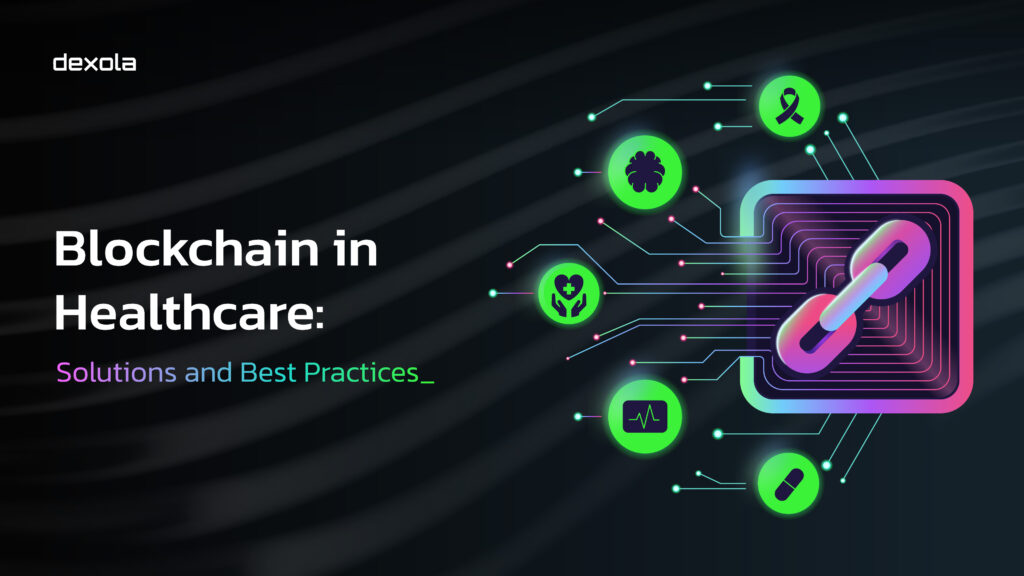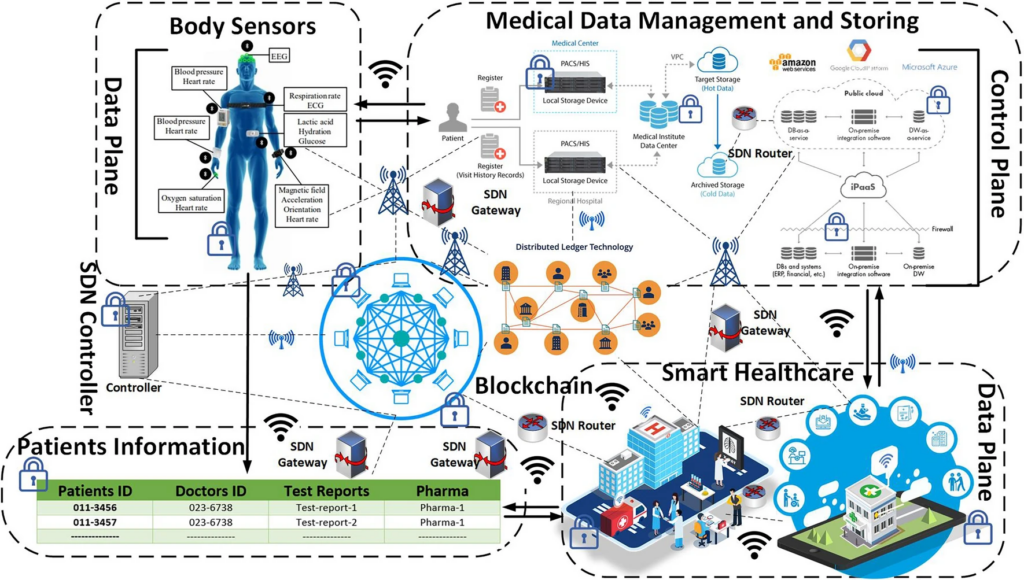Blockchain in Healthcare: Solutions and Best Practices

Blockchain technology is an innovative method of digital distributed ledger that uses blocks of information and links them into a chain. This distributed registry allows you to trust and control transactions and data without intermediate centralized authority.
In 2024, blockchain (BC) will continue developing, bringing even more innovations and opportunities to various spheres of life, including medicine. According to a BIS research report, it is expected that by 2025, the global healthcare market’s spending on blockchain will reach $5.61 billion.
With the blockchain in healthcare technology, the exchange of medical data between various clinics and institutions gets optimized, simplifying and speeding up the patient’s treatment process. In addition, this distributed database increases the security of storing and transferring medical data, protecting it from unauthorized access and interference.
Read the article to learn about how BC technology is used in healthcare, what effective blockchain implementation practices exist today, and what trends and prospects this technology has.
Also, you will learn what advantages Dexola provides in implementing digital technologies for medicine. In conclusion, we summarize the potential of blockchain and healthcare together.
Key Blockchain Use Cases in Healthcare
One of the challenges of modern healthcare is the need to maintain a balance between confidentiality of medical data and improving the quality of patient care. And the blockchain in this sense has become a reasonable response to this request. This technology offers secure data exchange tools. It is also resistant to external influences since it has a decentralized nature.
So, here are the most popular use cases of blockchain in healthcare.
Electronic health records (EHRs)
Electronic Health Records (EHR) are digital analogs of traditional paper patient records. They store a wide range of patient data, including personal demographic data, medical history, current and past diagnoses, medication data, allergies, vaccinations, and family medical history. One of the main advantages of EHR is its accessibility.
Supply chain management
Another popular scenario for using blockchain for healthcare is supply chain management, as well as anti-counterfeiting. Counterfeit and substandard medicines are a common problem in the pharmaceutical industry. Blockchain can solve this problem by providing transparency at all stages of the production, supply, and sale of medicines.
Patient consent management
Blockchain optimizes the data exchange between various parties in the healthcare sector. These are healthcare providers, researchers, and insurance companies. So, patients can control how their data is transmitted, processed, and used. In addition, patients can decide who will access their personal information.
Clinical trials and research
Blockchain helps to simplify and improve the processes of conducting clinical trials. Due to the results of such studies, patients eventually receive more effective therapy. The data obtained using blockchain technology is characterized by higher information content and reliability. It contributes to an increase in the number of clinical trials.
Vaccine distribution
Machine learning algorithms help governments develop more effective vaccination strategies in various scenarios.
For example, BC and algorithms have been the leading technologies used in optimizing the distribution of COVID-19 vaccines. An outstanding innovative feature was the support of the existing vaccine distribution system.
Healthcare internet of things (IoT)
In healthcare, IoT technology is used for real-time data streaming. With access to current information, healthcare providers can make faster and more effective decisions. Examples of the use of IoT in medicine include remote monitoring of patients, tracking attacks of chronic diseases, smart contact lenses, indoor tracking systems, and more.
Device tracking
Portable medical devices help treat patients and provide doctors with access to crucial data. Blockchain offers a platform that ensures the safe collection and storage of vital medical data.
Cryptocurrency payments
In modern medicine, there are many options to use of blockchain in healthcare for conducting payment transactions. The simplest example is the virtually untraceable reimbursement of medical expenses in Bitcoin or other cryptocurrencies.
It comes in handy when a patient wishes to maintain confidentiality regarding the medical services provided to them.
Drug traceability
BC is a reliable solution to the problem of authenticity of medicines for pharmacy automation. The technology allows you to track each drug down to its origin.
Thus, thanks to the benefits of blockchain in healthcare, it is easy to track the movement of medicines from one side to the other in real-time. Drug consumers can also verify the authenticity of medicines by scanning a QR code and viewing information about the maker and other relevant participants in the supply chain.
Best Practices for Implementing Blockchain in Healthcare
Blockchains can be successfully used to store medical data. The peer-to-peer architecture of the blockchain allows you to synchronize updates in all copies of patient records in real-time, even if they are stored on different computers.

Here are the best practices for implementing blockchain in healthcare.
Ensuring compliance with regulations like HIPAA
HIPAA compliance is the process of ensuring the security and protection of confidential patient data. This process includes taking precautions to save data, staff training, risk assessment, reporting, etc.
Compliance with HIPAA rules is crucial for medical startups and organizations working with classified medical information.
Three main HIPAA rules are the Privacy Rule, the Security Rule, and the Enforcement Rule.
Follow interoperability standards
Interoperability is defined as the ability of different systems to interact with each other without restrictions.
In medicine, interoperability is a means of optimizing the health of individuals and society through the compatibility of various medical information systems, medical equipment, and applications.
Patient-centered interaction ensures more efficient data exchange in healthcare.
Techniques to address scalability issues and ensure efficient data processing (performance optimization)
As more and more healthcare organizations implement BC, scalability becomes crucial. How can this be achieved with blockchain in healthcare industry? By using segmentation or layer two protocols.
For example, the Regional Health Information Exchange Network (HIE) uses blockchain to securely share patient data. Scalability, in this case, is achieved by dividing the data into several nodes.
Patient-centricity
Blockchain-based collaboration provides patient-centered medical care. By leveraging the power of blockchain technology, healthcare providers can enhance data security, optimize interactions, empower patients, and more. Thanks to cooperation with the blockchain, patients gain control over their medical data.
Emerging Trends and Innovations for 2024 and Beyond
The digitalization of the medical sector will continue to develop rapidly in the coming years. Here are just some of the blockchain technology in healthcare trends that exist at the moment.
Convergence of IoT, artificial intelligence and blockchain
The Internet of Things, artificial intelligence, and blockchain are general technologies for the 4th Industrial Revolution. The thing is that IoT, AI, and blockchain complement each other while eliminating several disadvantages that manifest themselves in their independent implementation.
Decentralized identification systems
A centralized approach to storing medical information is vulnerable to hacking. However, there is a solution. The application of blockchain in healthcare that provides decentralized access will help in this. One of the promising technologies that offers the possibility of decentralization, data protection, and interaction is the blockchain.
Smart contracts
Smart contracts bring benefits to healthcare stakeholders such as service providers, payers, patients, and researchers. With their help, the quality of medical care is improved.
Thanks to digital protocols, administrative costs are reduced, the number of delays is minimized, and the need for intermediaries and manual intervention is reduced.
Unlock Your Custom Healthcare Blockchain Potential with Dexola
Blockchain-based technology is attracting the attention of an increasing number of companies worldwide, including the health sector.
Dexola is one of the leading blockchain development companies. Our team of experienced developers offer you the best solutions for your custom use of blockchain in healthcare.
We specialize in EVM-compatible blockchains and have sufficient experience working with Ethereum, Binance Chain, Fantom, and Polygon.
We use a reliable methodology for developing applications on the blockchain, which helps to achieve a higher level of security. With the help of a design engine, cryptographic algorithms, and distributed computing, we create secure applications.
Dexola cooperates with various organizations, creating long-term relationships and offering our clients comprehensive services.
Future Outlook
One of the prospects for the development of blockchain solutions for healthcare is its wide application. More and more companies are beginning to realize the advantages and potential of blockchain in this area.
Blockchain is now more associated with cryptocurrencies, but in the coming years, we will see how it will become an integral part of our daily lives.
It is also worth adding that the blockchain is closely linked to the development of artificial intelligence. Thanks to this technology, unique registers of artificial intelligence are created, which allow you to store information about its various algorithms and models.
In addition, in 2024, the blockchain will allow you to create and manage smart contracts for artificial intelligence.
Conclusion
Blockchain technologies are being implemented in all spheres, including medicine. Thanks to them, it became possible to digitize the necessary data and work with all documents within one large global public information system. Thus, the cooperation of doctors with blockchain specialists will allow medicine to keep up with other branches of science and to use the achievements of rapidly growing digital technologies.
Blockchain 2024 is a turning point that will open up new opportunities for creating a sustainable and transparent digital economy. The results of the implementation of blockchain technology in healthcare will be visible shortly.